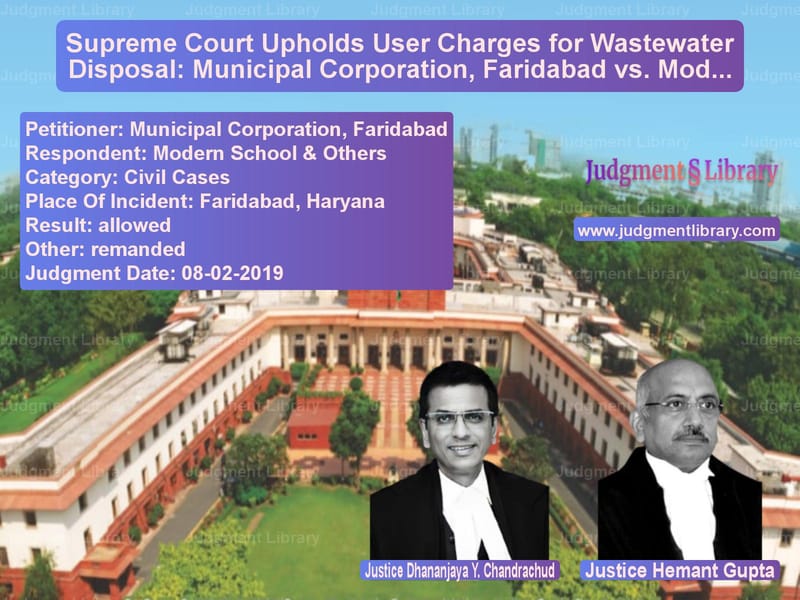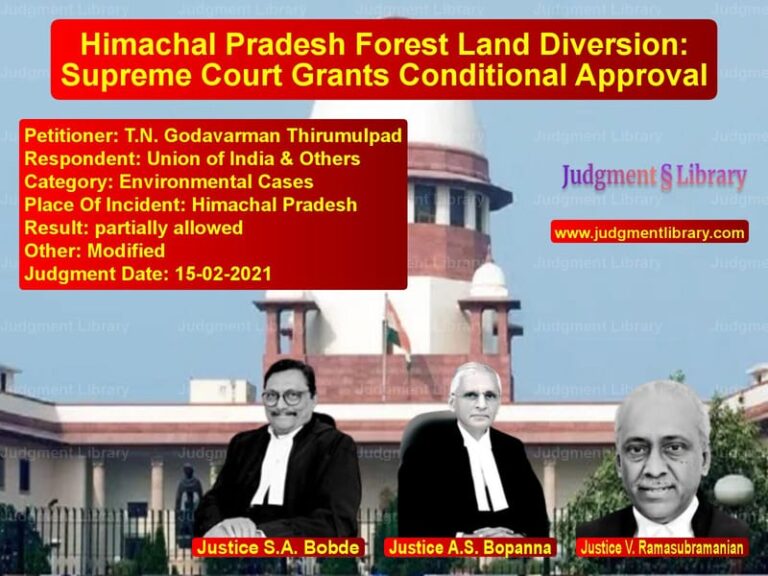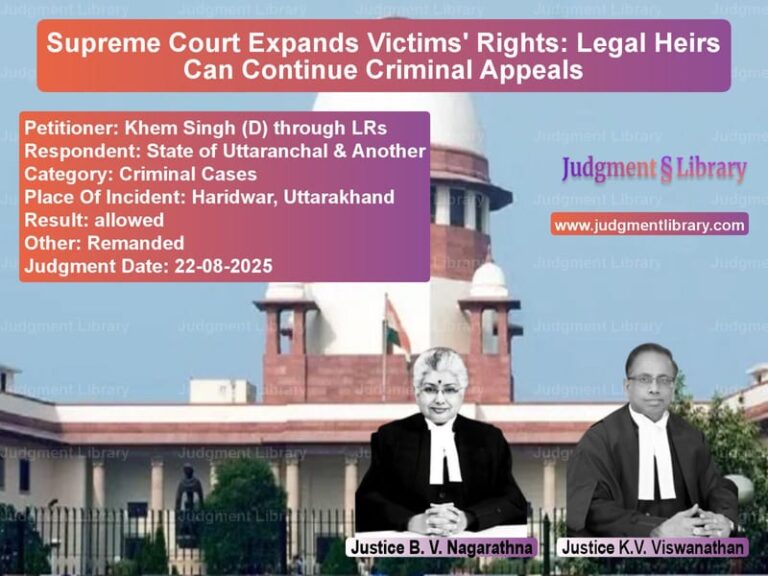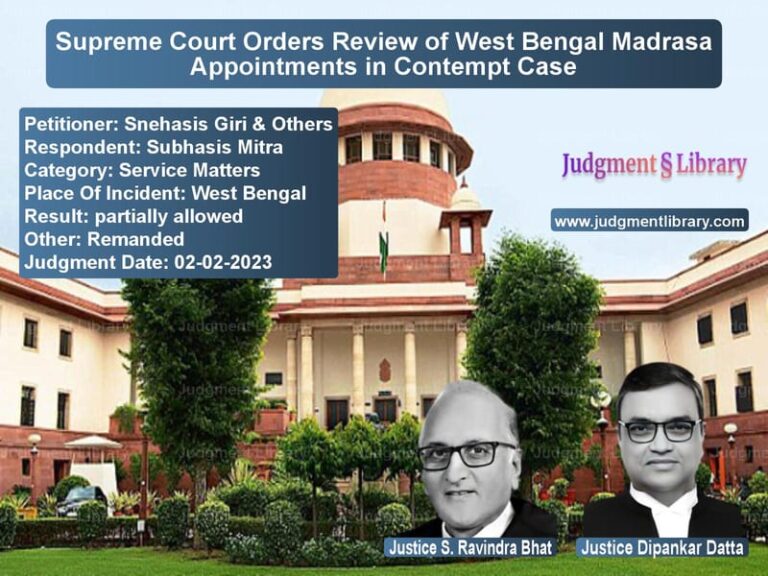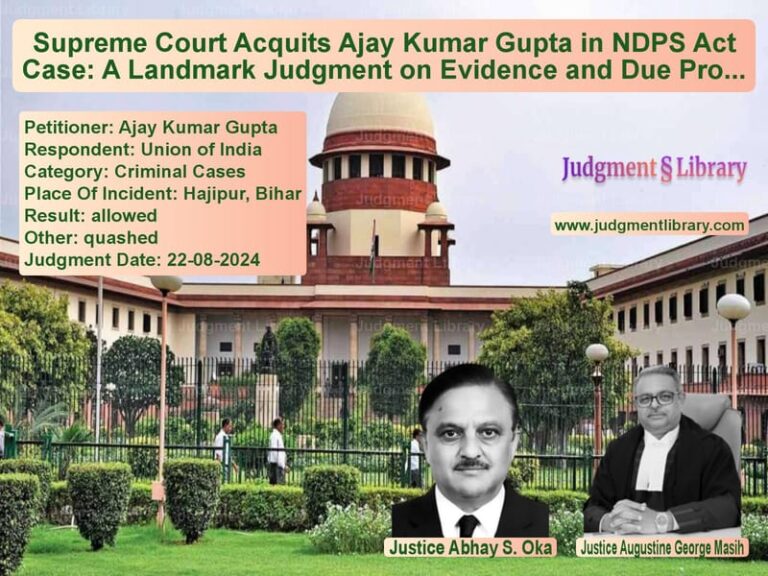Supreme Court Upholds User Charges for Wastewater Disposal: Municipal Corporation, Faridabad vs. Modern School
The Supreme Court of India, in Municipal Corporation, Faridabad vs. Modern School & Others, upheld the decision of the Municipal Corporation, Faridabad, to impose user charges on schools for discharging wastewater into the municipal sewer system. The ruling clarified the distinction between municipal user charges and taxes under the Haryana Municipal Corporation Act, 1994.
Background of the Case
The case arose when the Municipal Corporation, Faridabad, issued a notice to several schools, including Modern School, requiring them to pay user charges for discharging wastewater from their privately installed tubewells into the municipal drainage system.
The Corporation had previously issued an office order on June 14, 1999, regularizing tubewells within municipal limits and mandating that all private tubewell owners register with the Central Ground Water Board. The Corporation further imposed user charges for wastewater disposal, arguing that:
- Schools were extracting water from tubewells and discharging wastewater into municipal drains.
- Such wastewater disposal required maintenance and management by the Corporation.
- The user charges were necessary to compensate the Corporation for handling and treating wastewater.
Petitioner’s Arguments
Modern School and other schools challenged the municipal notice, arguing that:
- The user charges were effectively a tax and should have been imposed only with the prior approval of the State Government, as required under Sections 87 and 88 of the Haryana Municipal Corporation Act.
- They had installed tubewells because the water supply from the Corporation was inadequate for their needs, including drinking, sanitation, and maintaining school lawns.
- They had already registered their tubewells with the Central Ground Water Board.
High Court’s Ruling
The Punjab and Haryana High Court ruled in favor of the schools, holding that:
- The user charges imposed by the Corporation amounted to a fee or tax under Section 88 of the Act.
- As per the law, such charges could not be levied without prior approval from the State Government.
- The Corporation had no authority to impose these charges unilaterally.
Supreme Court’s Observations
1. User Charges Are Not a Tax or Fee
The Supreme Court found that the High Court had misinterpreted the nature of the charges. The judgment stated:
“The user charges claimed by the Corporation are not a tax or fee under Sections 87 or 88 of the Act, but charges for the use of municipal drains for wastewater disposal.”
2. Schools Are Using Municipal Services
The Court held that schools were discharging wastewater from tubewells into municipal drains, thereby utilizing municipal services. The ruling emphasized:
“The Corporation is justified in levying user charges as the wastewater from the Schools is carried by the municipal drains, which require maintenance and operational costs.”
3. Authority to Impose User Charges
The Court referred to Section 205 of the Haryana Municipal Corporation Act, which prohibits unauthorized connections to municipal drains. The judgment noted:
“Without the written permission of the Commissioner, no person shall make any connection with municipal drains. Instead of disconnecting unauthorized wastewater disposal, the Corporation imposed user charges, which is a reasonable administrative decision.”
4. Schools Had Accepted the Charges Initially
The Supreme Court also noted that some schools had initially agreed to regularize the wastewater discharge by paying user charges but later disputed them. The ruling stated:
“The records leave no doubt that the Corporation’s demand is justified. The Schools first sought regularization but later challenged the charges on legal grounds.”
Final Judgment
The Supreme Court allowed the appeal and upheld the user charges, ruling that:
- The charges did not require prior State Government approval as they were not a tax or fee.
- Schools must pay user charges for discharging wastewater into municipal drains.
- The Punjab and Haryana High Court’s decision was set aside, and the writ petitions were dismissed.
Key Takeaways
- Municipal user charges are not taxes: The Court clarified that fees for wastewater disposal differ from statutory taxes and can be imposed by local authorities.
- Schools using municipal services must pay: Any institution discharging wastewater into municipal infrastructure is liable for charges.
- High Court’s misinterpretation corrected: The Supreme Court overturned the ruling that required prior State Government approval for such charges.
- Legal compliance in waste disposal: Unauthorized disposal of wastewater into municipal drains is subject to regulatory oversight and charges.
Conclusion
The Supreme Court’s ruling in Municipal Corporation, Faridabad vs. Modern School sets a precedent for local government authority in levying user charges. The judgment reaffirms that institutions benefiting from municipal services must contribute to their maintenance, ensuring a fair and equitable system of urban infrastructure usage.
Petitioner Name: Municipal Corporation, Faridabad.Respondent Name: Modern School & Others.Judgment By: Justice Dhananjaya Y. Chandrachud, Justice Hemant Gupta.Place Of Incident: Faridabad, Haryana.Judgment Date: 08-02-2019.
Don’t miss out on the full details! Download the complete judgment in PDF format below and gain valuable insights instantly!
Download Judgment: Municipal Corporatio vs Modern School & Othe Supreme Court of India Judgment Dated 08-02-2019.pdf
Direct Downlaod Judgment: Direct downlaod this Judgment
See all petitions in Property Disputes
See all petitions in Consumer Rights
See all petitions in Public Interest Litigation
See all petitions in Judgment by Dhananjaya Y Chandrachud
See all petitions in Judgment by Hemant Gupta
See all petitions in allowed
See all petitions in Remanded
See all petitions in supreme court of India judgments February 2019
See all petitions in 2019 judgments
See all posts in Civil Cases Category
See all allowed petitions in Civil Cases Category
See all Dismissed petitions in Civil Cases Category
See all partially allowed petitions in Civil Cases Category

